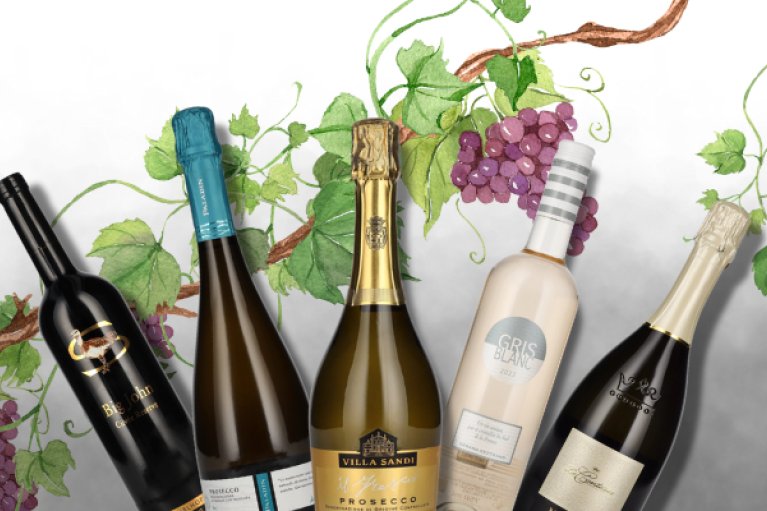Before buying wine: The history of wine
Before you buy just any wine in the store, you should also learn a little about the history. After all, wine was grown in parts of Asia as early as the 6th century BC. Georgia and also today's Armenia are often mentioned as countries of origin. At that time, wine already had a high value in agriculture as well as in society and culture. Also in ancient mythologies, various deities such as Osiris, Dionysus, Bacchus and Gilgamesh represented the noble drop. Wine was used for religious worship and to get (apparently) closer to deities in ecstasy. In the Roman Empire, everything from the beginning of the harvest to the cutting of the vines was made a religious affair. According to the Bible, Noah was the first vinedresser in history. In the Christian and Jewish religions, wine is considered a symbol of celebration and redemption. Even in art and culture, wine has always been present, especially when it came to celebration. Even today, you can rarely avoid buying wine when planning a celebration.
Components of wine
The basic components of wine include water, acid and sugar. The sugar is converted into alcohol during fermentation, leaving a residual sugar content. It also contains phenols (colorants), which affect color, odor, texture and taste, and tannins (tannins), which are responsible for the bitter taste. Tannins and acids also have a preservative effect, which is what makes the wine we buy last so long.
The viticulture
The terroir
Terroir is the term used to describe the factors given by nature to influence a specific location and their effect on the plants grown, in this case the vines. These include climatic conditions, solar energy, the shape of the terrain, the composition of the soil and its moisture. A complex interplay of these factors has a significant effect on the development of the vines and their grapes, and ultimately on the wine you choose to buy.
The soil, the terrain and the climate
The composition of the soil has a significant impact on the characteristics and quality of the wine. Soils with a high percentage of limestone produce wines with particular delicacy and good conditions for aging. While a high percentage of clay in the soil produces heavy wines, a high percentage of gravel accelerates grape ripening, so that the finished wines can be ready for purchase more quickly. Balanced moisture levels can prove extremely important during periods of low and high rainfall. The microclimate of the region also plays a crucial role. In cooler wine growing areas, this relates to sun exposure and distance from water reservoirs. In order for you to end up buying the ideal wine, an optimal environment for the grape varieties is required.
The grape varieties
The cultivation of grape varieties by means of crossbreeding and selection has also been worked out in the course of the long development of viticulture. In this process, crossbreeding was created by nature and also by man, which is why today we can buy a huge variety of different wines. Depending on the location and climate, certain grape varieties can develop better or worse. In order to select the most suitable grape varieties, a special intuition and knowledge of the winemakers is necessary. In the European Union there are certain legally approved grape varieties, which must be strictly observed.
Wine varieties and their production
On delicando you will find everything from white wine, red wine, rosé wine, sparkling wine to sparkling wine and champagne, which makes the heart of the wine sommelier beat faster. In the respective wine categories, the different types of wine are explained in more detail.
White wine production
The grapes are mechanically or manually freed from their stems and then crushed, resulting in a thick mixture of pulp, skin, juice and seeds, called mash. It is left to rest for a few hours, after which it is pressed, thus producing the must. This is next sulfurized to counteract spoilage and then poured into fermentation tanks. There, after the addition of certain yeast cultures, fermentation takes place, converting sugar into alcohol. Once the fermentation process is complete, the wine is separated from the yeast. Some are then aged for months in steel tanks or in wooden barrels before we can buy the wines in stores.
Production of red wine
The difference lies mainly in the order of the operations. In red wine, it is not the must that is fermented, but the mash. The grape skin gives the wine its red color. After fermentation is complete, the red wine is pressed and then aged. Then it is stored, bottled and transported to wine stores & co, where enthusiasts prefer to buy their wine.
Why is rosé wine pink?
Rosé wines are produced by subjecting red wine grapes to the process of white wine production. In addition, the mash is left to stand for a while, which allows the rosé to take on pigments from the grape skins, giving it its characteristic color. The rosé wine is especially popular with women because of its beautiful color, but also because of its smooth taste.









































































 Login with Amazon
Login with Amazon